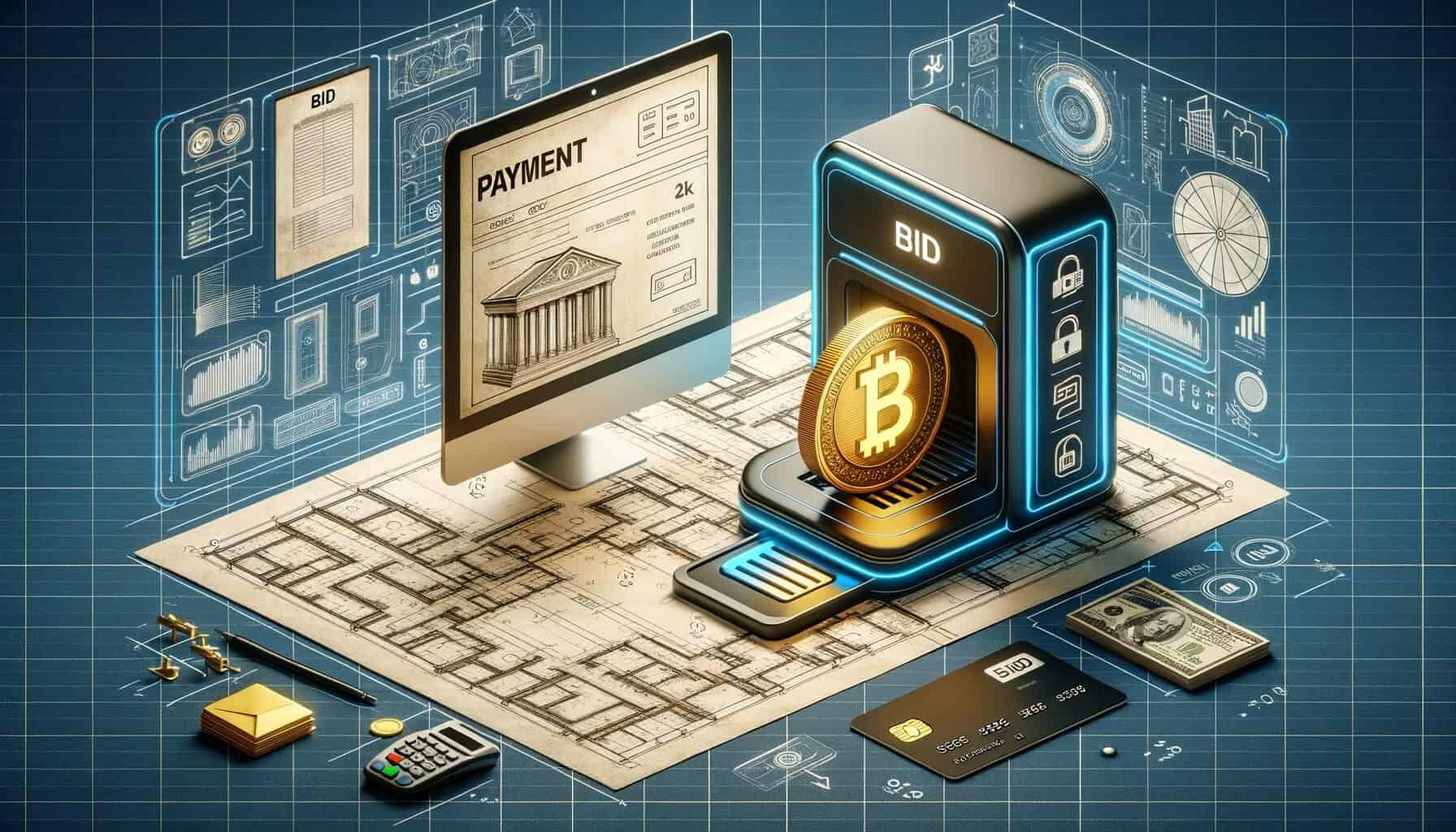
By alphacardprocess April 5, 2025
In today’s digital age, accepting online payments has become a necessity for businesses across various industries, including the construction sector. The traditional methods of accepting payments, such as checks and cash, are gradually being replaced by more convenient and secure online payment systems.
This article will explore the benefits of accepting online payments in the construction industry, provide a detailed guide on how to set up an online payment system for construction bids and proposals, discuss the importance of choosing the right online payment gateway, highlight the significance of ensuring security and fraud prevention in online construction payments, offer insights on streamlining the payment process, provide best practices for communicating online payment policies to clients, address common FAQs about accepting online payments for construction projects, and conclude with a summary of the key points discussed.
Benefits of Accepting Online Payments in the Construction Industry

1. Increased Convenience: Accepting online payments allows construction businesses to offer their clients a convenient and hassle-free way to make payments. Clients can easily pay their bills from anywhere, at any time, using their preferred payment method, whether it’s credit/debit cards, digital wallets, or bank transfers.
2. Faster Payment Processing: Online payment systems enable construction businesses to receive payments quickly, reducing the time and effort spent on manual processing. With instant payment confirmation, businesses can streamline their cash flow and allocate resources more efficiently.
3. Improved Cash Flow Management: Accepting online payments provides construction businesses with better control over their cash flow. They can track and monitor incoming payments in real-time, allowing for more accurate financial planning and forecasting.
4. Reduced Administrative Costs: Online payment systems automate the payment collection process, eliminating the need for manual data entry and reducing administrative costs. This frees up valuable time and resources that can be redirected towards core business activities.
5. Enhanced Professionalism and Credibility: Offering online payment options enhances the professional image of construction businesses. It instills confidence in clients, demonstrating that the business is technologically advanced and committed to providing a seamless customer experience.
How to Set Up an Online Payment System for Construction Bids and Proposals

Setting up an online payment system for construction bids and proposals involves several steps. Here’s a detailed guide to help you get started:
1. Determine Your Payment Needs: Assess your business requirements and identify the types of payments you want to accept. Consider whether you need recurring payments, payment plans, or the ability to accept international payments.
2. Choose an Online Payment Gateway: Research and select a reliable online payment gateway that meets your specific needs. Consider factors such as transaction fees, security features, integration options, and customer support.
3. Create an Account: Sign up for an account with the chosen payment gateway. Provide the necessary information, including your business details, bank account information, and any required documentation.
4. Integrate the Payment Gateway: Integrate the payment gateway with your construction bids and proposals system. This may involve installing plugins or APIs provided by the payment gateway provider.
5. Configure Payment Settings: Set up your payment settings, including the types of payment methods you want to accept, currency options, and any additional customization options offered by the payment gateway.
6. Test the Payment System: Before going live, thoroughly test the payment system to ensure it functions correctly. Make test transactions using different payment methods to verify that payments are processed accurately.
7. Implement Security Measures: Implement robust security measures to protect sensitive customer data and prevent fraud. This may include using SSL encryption, tokenization, and complying with industry security standards.
8. Train Your Staff: Provide training to your staff on how to use the online payment system effectively. Ensure they understand the payment process, how to troubleshoot common issues, and how to assist customers with payment-related queries.
9. Communicate the Payment Options: Clearly communicate the availability of online payment options to your clients. Update your website, proposals, and invoices to include instructions on how to make online payments.
10. Monitor and Optimize: Continuously monitor the performance of your online payment system and gather feedback from clients. Identify areas for improvement and optimize the system to enhance the payment experience.
Choosing the Right Online Payment Gateway for Construction Projects

Selecting the right online payment gateway is crucial for the success of your construction business. Consider the following factors when choosing a payment gateway:
1. Transaction Fees: Compare the transaction fees charged by different payment gateway providers. Look for a provider that offers competitive rates without compromising on security and reliability.
2. Security Features: Ensure that the payment gateway provides robust security features to protect sensitive customer data. Look for features such as SSL encryption, fraud detection, and tokenization.
3. Integration Options: Check if the payment gateway integrates seamlessly with your existing construction bids and proposals system. Look for plugins or APIs that simplify the integration process.
4. Payment Methods: Consider the payment methods supported by the payment gateway. Ideally, it should offer a wide range of options, including credit/debit cards, digital wallets, and bank transfers, to cater to diverse client preferences.
5. International Payments: If your construction business operates globally or deals with international clients, choose a payment gateway that supports international payments and multiple currencies.
6. Customer Support: Evaluate the customer support provided by the payment gateway provider. Ensure they offer timely assistance and have a reputation for resolving issues promptly.
Ensuring Security and Fraud Prevention in Online Construction Payments

Security and fraud prevention are paramount when accepting online payments for construction bids and proposals. Implement the following measures to safeguard your business and your clients’ data:
1. Use SSL Encryption: Secure Socket Layer (SSL) encryption ensures that all data transmitted between your website and the payment gateway is encrypted, protecting it from unauthorized access.
2. Tokenization: Tokenization replaces sensitive customer data, such as credit card numbers, with unique tokens. This minimizes the risk of data breaches, as the tokens cannot be reverse-engineered to obtain the original data.
3. PCI Compliance: Ensure that your payment gateway is Payment Card Industry Data Security Standard (PCI DSS) compliant. This certification ensures that the payment gateway adheres to industry best practices for data security.
4. Two-Factor Authentication: Implement two-factor authentication for accessing your online payment system. This adds an extra layer of security by requiring users to provide a second form of verification, such as a unique code sent to their mobile device.
5. Fraud Detection Tools: Utilize fraud detection tools provided by the payment gateway to identify and prevent fraudulent transactions. These tools analyze transaction patterns and flag suspicious activities for further investigation.
6. Regular Security Audits: Conduct regular security audits to identify vulnerabilities in your online payment system. Engage third-party security experts to perform penetration testing and ensure your system is secure.
Streamlining the Payment Process for Construction Bids and Proposals
Streamlining the payment process is essential to provide a seamless experience for your clients. Follow these best practices to optimize the payment process:
1. Simplify Payment Options: Offer a variety of payment options to cater to different client preferences. Include popular methods such as credit/debit cards, digital wallets, and bank transfers.
2. Provide Clear Instructions: Clearly communicate the steps required to make a payment. Include detailed instructions on your website, proposals, and invoices to guide clients through the payment process.
3. Automate Invoicing: Use online invoicing software to automate the generation and delivery of invoices. This reduces manual errors and ensures timely invoicing, improving cash flow management.
4. Offer Recurring Payments: If applicable, provide the option for recurring payments. This is particularly useful for long-term construction projects with regular billing cycles.
5. Send Payment Reminders: Send automated payment reminders to clients who have outstanding invoices. This helps minimize late payments and improves cash flow.
6. Integrate with Accounting Software: Integrate your online payment system with your accounting software to streamline financial record-keeping. This eliminates the need for manual data entry and reduces errors.
Best Practices for Communicating Online Payment Policies to Clients
Effectively communicating your online payment policies to clients is crucial for a smooth payment process. Follow these best practices to ensure clarity and transparency:
1. Update Your Website: Clearly state your online payment options on your website. Create a dedicated page or section that provides detailed information on how clients can make payments online.
2. Include Instructions in Proposals: Incorporate instructions on how to make online payments in your construction bids and proposals. This ensures that clients are aware of the available payment methods from the outset.
3. Provide Clear Invoices: Clearly outline the payment due date, amount, and payment options on your invoices. Include instructions on how to access the online payment portal or provide a direct payment link.
4. Offer Customer Support: Provide multiple channels for clients to seek assistance with online payments. This may include a dedicated support email address, a helpline, or a live chat feature on your website.
5. Address Security Concerns: Address any security concerns clients may have about making online payments. Highlight the security measures you have implemented to protect their data and assure them of the safety of the payment process.
6. Educate Clients: Educate your clients on the benefits of making online payments, such as convenience and faster processing times. Emphasize the advantages of online payments over traditional methods to encourage adoption.
Common FAQs about Accepting Online Payments for Construction Projects
Q1. Are online payments secure for construction projects?
Answer: Yes, online payments can be secure for construction projects if the necessary security measures are implemented. This includes using SSL encryption, tokenization, and complying with industry security standards.
Q2. What payment methods should I offer for construction bids and proposals?
Answer: It is recommended to offer a variety of payment methods, including credit/debit cards, digital wallets, and bank transfers. This allows clients to choose the method that is most convenient for them.
Q3. How long does it take to set up an online payment system for construction bids and proposals?
Answer: The time required to set up an online payment system depends on various factors, such as the complexity of your business requirements and the chosen payment gateway. It can range from a few days to a few weeks.
Q4. Can I accept international payments for construction projects?
Answer: Yes, many online payment gateways support international payments and multiple currencies. This allows you to accept payments from clients around the world.
Q5. How can I prevent fraud in online construction payments?
Answer: To prevent fraud, implement measures such as SSL encryption, tokenization, two-factor authentication, and fraud detection tools provided by the payment gateway. Regular security audits are also essential to identify vulnerabilities.
Q6. What should I do if a client disputes an online payment for a construction project?
Answer: If a client disputes an online payment, follow the dispute resolution process provided by your payment gateway. Provide any necessary evidence, such as invoices or project documentation, to support your case.
Conclusion
Accepting online payments for construction bids and proposals offers numerous benefits, including increased convenience, faster payment processing, improved cash flow management, reduced administrative costs, and enhanced professionalism.
By following the steps outlined in this article, construction businesses can set up an online payment system, choose the right payment gateway, ensure security and fraud prevention, streamline the payment process, communicate payment policies effectively, and address common FAQs. Embracing online payments not only improves the overall customer experience but also positions construction businesses for success in the digital era.